- Home
- Connie Willis
Cibola
Cibola Read online
Cibola
Connie Willis
Nominated for the Hugo Award for Best Short Story in 1991.
Cibola
by Connie Willis
“Carla, you grew up in Denver,” Jake said. “Here’s an assignment that might interest you.”
This is his standard opening line. It means he is about to dump another “local interest” piece on me.
“Come on, Jake,” I said. “No more nutty Bronco fans who’ve spray-painted their kids orange and blue, okay? Give me a real story. Please?”
“Bronco season’s over, and the NFL draft was last week,” he said. “This isn’t a local interest.”
“You’re right there,” I said. “These stories you keep giving me are of no interest, local or otherwise. I did the time machine piece for you. And the psychic dentist. Give me a break. Let me cover something that doesn’t involve nuttos.”
“It’s for the ‘Our Living Western Heritage’ series.” He handed me a slip of paper. “You can interview her this morning and then cover the skyscraper moratorium hearings this afternoon.”
This was plainly a bribe, since the hearings were front page stuff right now, and “historical interests” could be almost as bad as locals—senile old women in nursing homes rambling on about the good old days. But at least they didn’t crawl in their washing machines and tell you to push “rinse” so they could travel into the future. And they didn’t try to perform psychic oral surgery on you.
“All right,” I said, and took the slip of paper. “Rosa Turcorillo,” it read and gave an address out on Santa Fe. “What’s her phone number?”
“She doesn’t have a phone,” Jake said. “You’ll have to go out there.” He started across the city room to his office. “The hearings are at one o’clock.”
“What is she, one of Denver’s first Chicano settlers?” I called after him.
He waited till he was just outside his office to answer me. “She says she’s the great-granddaughter of Coronado,” he said, and beat a hasty retreat into his office. “She says she knows where the Seven Cities of Cibola are.”
I spent forty-five minutes researching Coronado and copying articles and then drove out to see his great-granddaughter. She lived out on south Santa Fe past Hampden, so I took I-25 and then was sorry. The morning rush hour was still crawling along at about ten miles an hour pumping carbon monoxide into the air. I read the whole article stopped behind a semi between Speer and Sixth Avenue.
Coronado trekked through the Southwest looking for the legendary Seven Cities of Gold in the 1540s, which poked a big hole in Rosa’s story, since any great-granddaughter of his would have to be at least three hundred years old.
There wasn’t any mystery about the Seven Cities of Cibola either. Coronado found them, near Gallup, New Mexico, and conquered them but they were nothing but mud-hut villages. Having been burned once, he promptly took off after another promise of gold in Quivira in Kansas someplace where there wasn’t any gold either. He hadn’t been in Colorado at all.
I pulled onto Santa Fe, cursing Jake for sending me on another wild-goose chase, and headed south. Denver is famous for traffic, air pollution, and neighborhoods that have seen better days. Santa Fe isn’t one of those neighborhoods. It’s been a decaying line of rusting railroad tracks, crummy bars, old motels, and waterbed stores for as long as I can remember, and I, as Jake continually reminds me, grew up in Denver.
Coronado’s granddaughter lived clear south past Hampden, in a trailer park with a sign with “Olde West Motel” and a neon bison on it, and Rosa Turcorillo’s old Airstream looked like it had been there since the days when the buffalo roamed. It was tiny, the kind of trailer I would call “Turcorillo’s modest mobile home” in the article, no more than fifteen feet long and eight wide.
Rosa was nearly that wide herself. When she answered my knock, she barely fit in the door. She was wearing a voluminous turquoise housecoat, and had long black braids.
“What do you want?” she said, holding the metal door so she could slam it in case I was the police or a repo man.
“I’m Carla Johnson from the Denver Record,” I said. “I’d like to interview you about Coronado.” I fished in my bag for my press card. “We’re doing a series on ‘Our Living Western Heritage.’” I finally found the press card and handed it to her. “We’re interviewing people who are part of our past.”
She stared at the press card disinterestedly. This was not the way it was supposed to work. Nuttos usually drag you in the house and start babbling before you finish telling them who you are. She should already be halfway through her account of how she’d traced her ancestry to Coronado by means of the I Ching.
“I would have telephoned first, but you didn’t have a phone,” I said.
She handed the card to me and started to shut the door.
“If this isn’t a good time, I can come back,” I babbled. “And we don’t have to do the interview here if you’d rather not. We can go to the Record office or to a restaurant.”
She opened the door and flashed a smile that had half of Cibola’s missing gold in it. “I ain’t dressed,” she said. “It’ll take me a couple of minutes. Come on in.”
I climbed the metal steps and went inside. Rosa pointed at a flowered couch, told me to sit down and disappeared into the rear of the trailer.
I was glad I had suggested going out. The place was no messier than my desk, but it was only about six feet long and had the couch, a dinette set, and a recliner. There was no way it would hold me and Coronado’s granddaughter, too. The place may have had a surplus of furniture but it didn’t have any of the usual crazy stuff, no pyramids, no astrological charts, no crystals. A deck of cards was laid out like the tarot on the dinette table, but when I leaned across to look at them, I saw it was a half-finished game of solitaire. I put the red eight on the black nine.
Rosa came out, wearing orange polyester pants and a yellow print blouse and carrying a large black leather purse. I stood up and started to say, “Where would you like to go? Is there someplace close?” but I only got it half out.
“The Eldorado Cafe,” she said and started out the door, moving pretty fast for somebody three hundred years old and three hundred pounds.
“I don’t know where the Eldorado Cafe is,” I said, unlocking the car door for her. “You’ll have to tell me where it is.”
“Turn right,” she said. “They have good cinnamon rolls.”
I wondered if it was the offer of the food or just the chance to go someplace that had made her consent to the interview. Whichever, I might as well get it over with. “So Coronado was your great-grandfather?” I said.
She looked at me as if I were out of my mind. “No. Who told you that?”
Jake, I thought, who I plan to tear limb from limb when I get back to the Record. “You aren’t Coronado’s great-granddaughter?”
She folded her arms over her stomach. “I am the descendant of El Turco.”
El Turco. It sounded like something out of Zorro. “So it’s this El Turco who’s your great-grandfather?”
“Great-great. El Turco was Pawnee. Coronado captured him at Cicuye and put a collar around his neck so he could not run away. Turn right.”
We were already halfway through the intersection. I jerked the steering wheel to the right and nearly skidded into a pickup.
Rosa seemed unperturbed. “Coronado wanted El Turco to guide him to Cibola,” she said.
I wanted to ask if he had, but I didn’t want to prevent Rosa from giving me directions. I drove slowly through the next intersection, alert to sudden instructions, but there weren’t any. I drove on down the block.
“And did El Turco guide Coronado to Cibola?”
“Sure. You should have turned left back there,” she said.
“They make their own cinnamon rolls,” she said, looking at me hopefully as we went in. “With frosting.”
We sat down in a booth. “Have anything you want,” I said. “This is on the Record.”
She ordered a cinnamon roll and a large Coke. I ordered coffee and began fishing in my bag for my tape recorder.
“You lived here in Denver a long time?” she asked.
“All my life. I grew up here.”
She smiled her gold-toothed smile at me. “You like Denver?”
“Sure,” I said. I found the pocket-sized recorder and laid it on the table. “Smog, oil refineries, traffic. What’s not to like?”
“I like it too,” she said.
The waitress set a cinnamon roll the size of Mile High Stadium in front of her and poured my coffee.
“You know what Coronado fed El Turco?” The waitress brought her large Coke. “Probably one tortilla a day. And he didn’t have no shoes. Coronado make him walk all that way to Colorado and no shoes.”
I switched the tape recorder on. “You say Coronado came to Colorado,” I said, “but what I’ve read says he traveled through New Mexico and Oklahoma and up into Kansas, but not Colorado.”
“He was in Colorado.” She jabbed her finger into the table. “He was here.”
I wondered if she meant here in Colorado or here in the Eldorado Cafe.
“When was that? On his way to Quivira?”
“Quivira?” she said, looking blank. “I don’t know nothing about Quivira.”
“Quivira was a place where there was supposed to be gold,” I said. “He went there after he found the Seven Cities of Cibola.”
“He didn’t find them,” she said, chewing on a mouthful of cinnamon roll. “That’s why he killed El Turco.”
“Coronado killed El Turco?”
“Yeah. After he led him to Cibola.”
This was even worse than talking to the psychic dentist.
“Coronado said El Turco made the whole thing up,” Rosa said. “He said El Turco was going to lead Coronado into an ambush and kill him. He said the Seven Cities didn’t exist.”
“But they did?”
“Of course. El Turco led him to the place.”
“But I thought you said Coronado didn’t find them.”
“He didn’t.”
I was hopelessly confused by now. “Why not?”
“Because they weren’t there.”
I was going to run Jake through his paper shredder an inch at a time. I had wasted a whole morning on this and I was not even going to be able to get a story out of it.
“You mean they were some sort of mirage?” I asked.
Rosa considered this through several bites of cinnamon roll. “No. A mirage is something that isn’t there. These were there.”
“But invisible?”
“No.”
“Hidden.”
“No.”
“But Coronado couldn’t see them?”
She shook her head. With her forefinger, she picked up a few stray pieces of frosting left on her plate and stuck them in her mouth. “How could he when they weren’t there?”
The tape clicked off, and I didn’t even bother to turn it over. I looked at my watch. If I took her back now I could make it to the hearings early and maybe interview some of the developers. I picked up the check and went over to the cash register.
“Do you want to see them?”
“What do you mean? See the Seven Cities of Cibola?”
“Yeah. I’ll take you to them.”
“You mean go to New Mexico?”
“No. I told you, Coronado came to Colorado.”
“When?”
“When he was looking for the Seven Cities of Cibola.”
“No, I mean when can I see them? Right now?”
“No,” she said, with that, ‘how dumb can anyone be?’ look. She reached for a copy of the Rocky Mountain News that was lying on the counter and looked inside the back page. “Tomorrow morning. Six o’clock.”
One of my favorite things about Denver is that it’s spread all over the place and takes you forever to get anywhere. The mountains finally put a stop to things twenty miles to the west, but in all three other directions it can sprawl all the way to the state line and apparently is trying to. Being a reporter here isn’t so much a question of driving journalistic ambition as of driving, period.
The skyscraper moratorium hearings were out on Colorado Boulevard across from the Hotel Giorgio, one of the skyscrapers under discussion. It took me forty-five minutes to get there from the Olde West Trailer Park.
I was half an hour late, which meant the hearings had already gotten completely off the subject. “What about reflecting glass?” someone in the audience was saying. “I think it should be outlawed in skyscrapers. I was nearly blinded the other day on the way to work.”
“Yeah,” a middle-aged woman said. “If we’re going to have skyscrapers, they should look like skyscrapers.” She waved vaguely at the Hotel Giorgio, which looks like a giant black milk carton.
“And not like that United Bank building downtown!” someone else said. “It looks like a damned cash register!”
From there it was a short illogical jump to the impossibility of parking downtown, Denver’s becoming too decentralized, and whether the new airport should be built or not. By five-thirty they were back on reflecting glass.
“Why don’t they put glass you can see through in their skyscrapers?” an old man who looked a lot like the time machine inventor said. “I’ll tell you why not. Because those big business executives are doing things they should be ashamed of, and they don’t want us to see them.”
I left at seven and went back to the Record to try to piece my notes together into some kind of story. Jake was there.
“How’d your interview with Coronado’s granddaughter go?” he asked.
“The Seven Cities of Cibola are here in Denver only Coronado couldn’t see them because they’re not there.” I looked around. “Is there a copy of the News someplace?”
“Here? In the Record building!” he said, clutching his chest in mock horror. “That bad, huh? You’re going to go work for the News?” But he fished a copy out of the mess on somebody’s desk and handed it to me. I opened it to the back page.
There was no “Best Times for Viewing Lost Cities of Gold” column. There were pictures and dates of the phases of the moon, road conditions, and “What’s in the Stars: by Stella.” My horoscope of the day read: “Any assignment you accept today will turn out differently than you expect.” The rest of the page was devoted to the weather, which was supposed to be sunny and warm tomorrow.
The facing page had the crossword puzzle, “Today in History,” and squibs about Princess Di and a Bronco fan who’d planted his garden in the shape of a Bronco quarterback. I was surprised Jake hadn’t assigned me that story.
I went down to Research and looked up El Turco. He was an Indian slave, probably Pawnee, who had scouted for Coronado, but that was his nickname, not his name. The Spanish had called him “The Turk” because of his peculiar hair. He had been captured at Cicuye, after Coronado’s foray into Cibola, and had promised to lead them to Quivira, tempting them with stories of golden streets and great stone palaces. When the stories didn’t pan out, Coronado had had him executed. I could understand why.
Jake cornered me on my way home. “Look, don’t quit,” he said. “Tell you what, forget Coronado. There’s a guy out in Lakewood who’s planted his garden in the shape of John Elway’s face. Daffodils for hair, blue hyacinths for eyes.”
“Can’t,” I said, sidling past him. “I’ve got a date to see the Seven Cities of Gold.”
Another delightful aspect of the Beautiful Mile-High City is that in the middle of April,
after you’ve planted your favorite Bronco, you can get fifteen inches of snow. It had started getting cloudy by the time I left the paper, but fool that I was, I thought it was an afternoon thunderstorm. The News’s forecast had, after all, been for warm and sunny. When I woke up at four-thirty there was a foot and half of snow on the ground and more tumbling down.
“Why are you going back if she’s such a nut?” Jake had asked me when I told him I couldn’t take the Elway garden. “You don’t seriously think she’s onto something, do you?” and I had had a hard time explaining to him why I was planning to get up at an ungodly hour and trek all the way out to Santa Fe again.
She was not El Turco’s great-great-granddaughter. Two greats still left her at two hundred and fifty plus, and her history was as garbled as her math, but when I had gotten impatient she had said, “Do you want to see them?” and when I had asked her when, she had consulted the News’s crossword puzzle and said, “Tomorrow morning.”
I had gotten offers of proof before. The time machine inventor had proposed that I climb in his washing machine and be sent forward to “a glorious future, a time when everyone is rich,” and the psychic dentist had offered to pull my wisdom teeth. But there’s always a catch to these offers.
“Your teeth will have been extracted in another plane of reality,” the dentist had said. “X-rays taken in this plane will show them as still being there,” and the time machine guy had checked his soak cycle and the stars at the last minute and decided there wouldn’t be another temporal agitation until August of 2158.
Rosa hadn’t put any restrictions at all on her offer. “You want to see them?” she said, and there was no mention of reality planes or stellar-laundry connections, no mention of any catch. Which doesn’t mean there won’t be one, I thought, getting out the mittens and scarf I had just put away for the season and going out to scrape the windshield off. When I got there she would no doubt say the snow made it impossible to see the Cities or I could only see them if I believed in UFO’s. Or maybe she’d point off somewhere in the general direction of Denver’s brown cloud and say, “What do you mean, you can’t see them?”

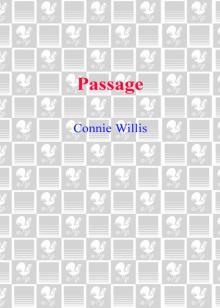 Passage
Passage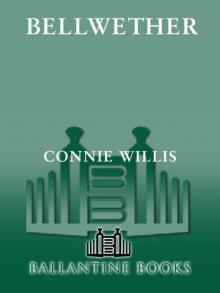 Bellwether
Bellwether Blackout
Blackout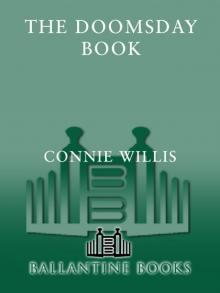 Doomsday Book
Doomsday Book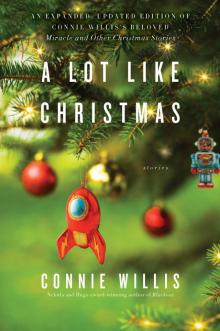 A Lot Like Christmas: Stories
A Lot Like Christmas: Stories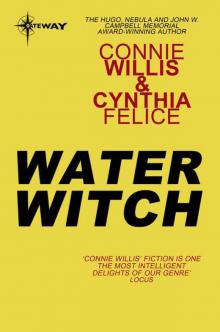 Water Witch
Water Witch To Say Nothing of the Dog
To Say Nothing of the Dog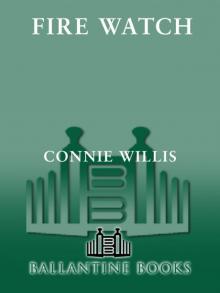 Fire Watch
Fire Watch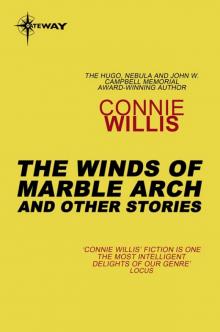 The Winds of Marble Arch and Other Stories
The Winds of Marble Arch and Other Stories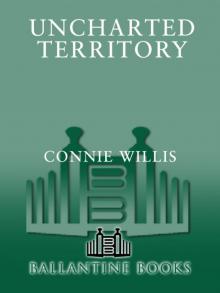 Uncharted Territory
Uncharted Territory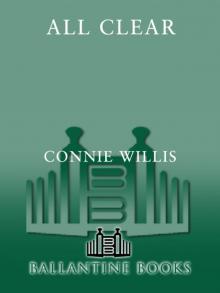 All Clear
All Clear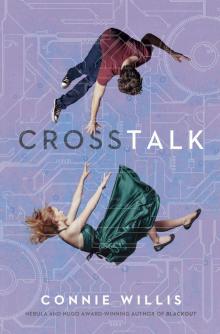 Crosstalk
Crosstalk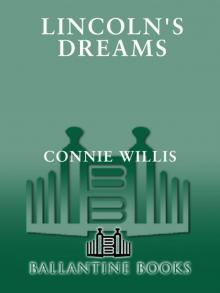 Lincoln's Dreams
Lincoln's Dreams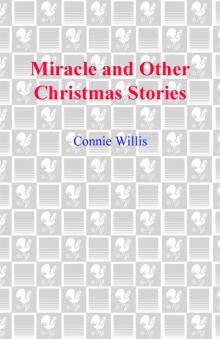 Miracle and Other Christmas Stories
Miracle and Other Christmas Stories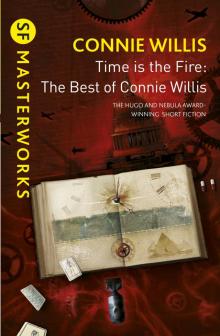 Time is the Fire
Time is the Fire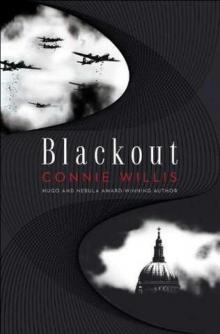 Blackout ac-1
Blackout ac-1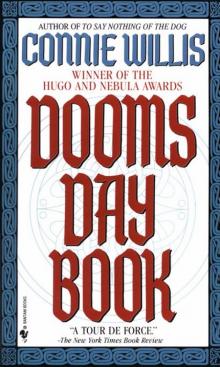 Dooms Day Book
Dooms Day Book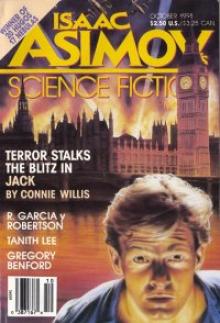 Jack
Jack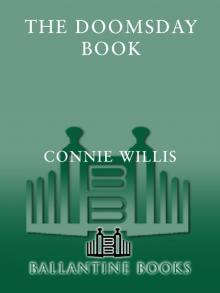 The Doomsday Book
The Doomsday Book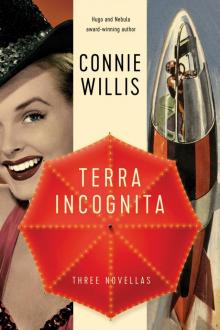 Terra Incognita
Terra Incognita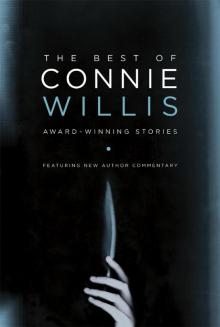 The Best of Connie Willis
The Best of Connie Willis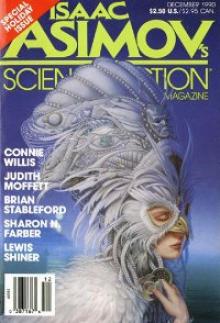 Cibola
Cibola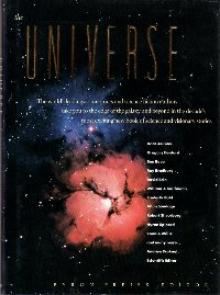 Schwarzschild Radius
Schwarzschild Radius Even the Queen
Even the Queen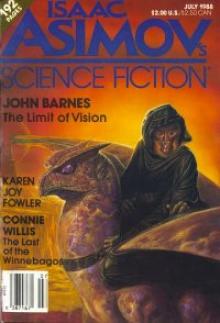 The Last of the Winnebagos
The Last of the Winnebagos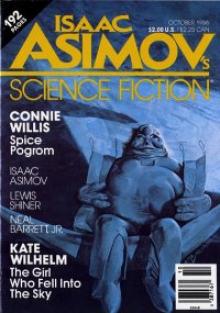 Spice Pogrom
Spice Pogrom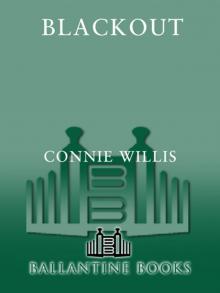 Oxford Time Travel 1 - Blackout
Oxford Time Travel 1 - Blackout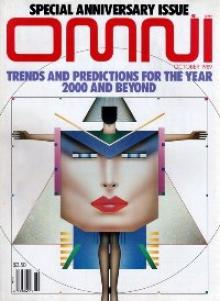 At The Rialto
At The Rialto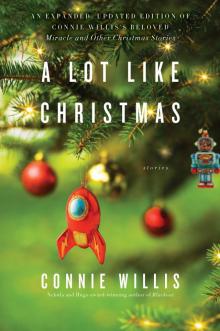 A Lot Like Christmas
A Lot Like Christmas